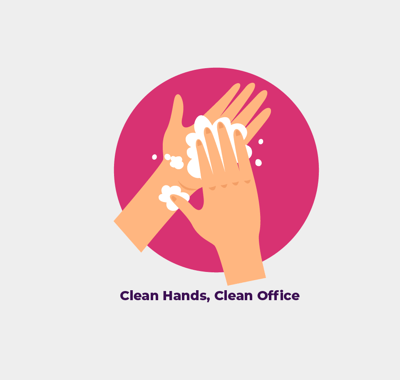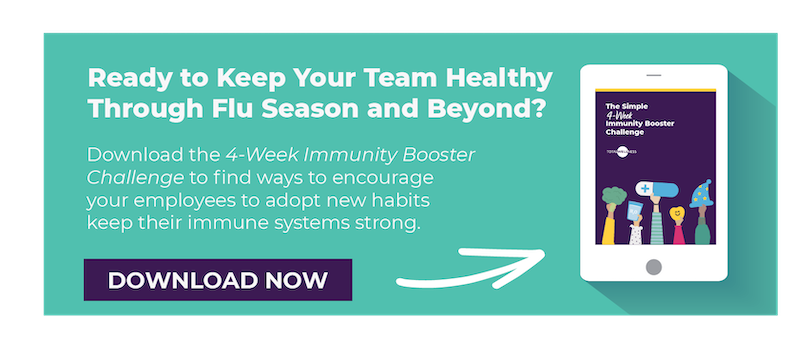 Clean hands are healthy hands.
Clean hands are healthy hands.
And dirty hands spread germs — lots of them.
One study found the typical work desk has more than 10 million bacteria covering it. That’s 400 times more germs than the average toilet seat.
Yuck.
Last week was National Handwashing Awareness Week, and while it may be over, flu season is not. Flu season peaks between December and February, which is why this important preventative measure should be discussed in all workplaces.
Even if it seems a little patronizing to tell adults in your office to “wash their hands,” consider it more of a public health announcement. Even a little PSA via a bathroom stall door flier can reduce the amount of germs spread around your office.
Here are the dirty details of why handwashing should be a hot topic in your office this time of year:
The Importance of Handwashing
Flu season peaks between December and February, which is why this important preventative measure should be discussed in all workplaces.
Washing your hands frequently will reduce your chances of getting sick or spreading it to other individuals in the workplace and at home.
It’s a simple way to prevent an entire workplace staff from being taken down by colds, the flu, and other viruses.
Even when sinks and soap aren’t available, keeping hand sanitizers around can remind employees to frequently sanitize hands after touching surfaces around the workplace.
How Often Should You Wash Your Hands?
It’s an inevitable fact that throughout the day we encounter germs. As we greet people, touch various surfaces and objects, germs end up on our hands. By regularly sanitizing and handwashing throughout the day, it can further prevent the spread of germs and illness.
Here’s when you should wash your hands:
Wash hands before:
- Eating
- Prepping food
- Treating wounds
- Caring for a sick or frail person
- Inserting or removing contact lenses
Wash hands after:
- Smoking
- Preparing food
- Shaking hands
- Treating wounds
- Handling garbage
- Using the restroom
- Changing diapers
- Blowing your nose, sneezing or coughing
If there’s visible dirt on your hands, it goes without saying that it's time to head to the bathroom and lather up. How often you should wash your hands really depends on your daily activities, but any time you do the above tasks, be sure to wash up to keep yourself — and others — healthy!
Want Employees to Wash Their Hands? Do This
Considering one of the germiest places in the world are bathrooms — namely the toilet — it’s not a bad idea to post reminders for users to wash their hands.
If you can find a funny sign that gets the message across, go ahead and stick it in the bathroom. Your employees will probably appreciate your sense of humor.
How to Wash Your Hands Step-by-Step
Yes, there’s a correct way to wash your hands. In the 30 or so seconds it takes to wash your hands, you can sing the “Happy Birthday” song twice. That’s how you’ll know you’ve done a thorough job.
Once you’re near a sink, here are the steps to take:
- Run your hands under warm water.
- Apply soap and lather vigorously to make bubbles.
- Scrub your wrists, back of hands, under nails, and between the fingers.
- Rinse off.
- Dry hands with a clean towel.
- If possible, turn off the sink handle with a towel.
- Open the door with a towel.
And while hand sanitizers are a great alternative when you can’t get to a sink, these shouldn’t be relied on as the only hand-cleaning method.
Why?
Sanitizers don’t kill all germs and also shouldn’t be used when your hands are filmed with dirt or grease. Hand sanitizers may also dry out your hands, too, causing cracks and even bleeding.
Hand Hygiene and Handwashing Facts
Personal hygiene starts with remembering to wash hands often. It’s been proven through research over the years that handwashing directly contributes to the health of individuals and entire communities.
Handwashing facts to share:
- Any hand soap will clean your hands. It doesn’t have to be antibacterial
- Handwashing can prevent 1 in 3 diarrhea-related illnesses
- Baby wipes don’t remove germs from your hands
- 1 in 5 respiratory infections can be prevented with handwashing
- Up to 16% of respiratory infections could be prevented by handwashing
Practicing good hand hygiene is a must to keep the spread of germs down. London researchers estimate if everyone washed their hands regularly, about 1 million deaths per year could be prevented.
Keep Your Workplace Clean
When flu season is in full swing, it’s important to remind employees on how to keep the germs from spreading around.
The number one way to prevent it? Ask sick employees to stay home.
Throughout the flu and cold season, remind employees the importance of the following:
- Handwashing
- Sanitizing work surfaces
- Covering a sneeze or cough
- Cleaning up work spaces
Keep cleaning supplies in stock, too, to make it easier for employees to keep their areas sanitized. Keyboards, door handles, and phones should be wiped down on a daily basis. Bleach wipes make it quick and easy to disinfect surfaces that are covered with germs.
Want to approach the subject gently? Gift your employees with little “Keep it Clean” gift baskets. Package up soap, hand sanitizer, tissues, and a mini packet of bleach wipes with a printout of the above handwashing facts.
While they may think you’re a germaphobe, at least your clean hands request will be done in a thoughtful way that doesn’t come off as nagging!
It’s that time of year: Everyone is getting sick. Check out our post to learn How to Avoid Spreading Germs at Work.
Hand washing vector created by macrovector



